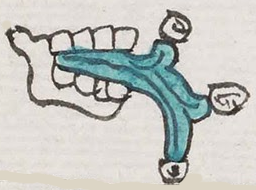Cualac (Mdz40r)
This compound sign, representing the place name Cualac, has two components. On the left, we see teeth, apparently representing the sound cua (he bites, he eats, or he lives from), and on the right, water, representing the sound a (from atl), water). The teeth are embedded in a skeletal jaw bone, white with black line drawings. The water is the usual turquoise blue with lines showing movement and white droplets/beads and white turbinate shells splashing off the stream. The locative suffix (-c, the short form of the postposition -co) is not shown visually.
Stephanie Wood
The letter l, in the middle, which is supplied by the gloss, clarifies that the cua- is really cual-, from cualli (good), and the biting image would then be meant to serve solely as the phonetic indicator, an abbreviation for cual-. There is nothing in the place name that would indicate that the teeth refer to the locative -tlan from tlantli]. The rationale behind using the skeletal jaw versus a jaw of a living person is obscure. Below, right, are shown some other skeletal themes.
This town is near Olinalá, which is in the state of Guerrero today.
Stephanie Wood
qualac. puo
Cualac, pueblo
Stephanie Wood
c. 1541, or by 1553 at the latest
Stephanie Wood
jaws, skeletal, skeletons, death, bites, biting, eating, drinking, water, shells, place, teeth, dientes, mandíbula, esqueletos, morder, comer, beber, la muerte, Qualac, nombres de lugares, hueso, huesos

cua, to bite, to eat, https://nahuatl.wired-humanities.org/content/cua
cual(li), good, https://nahuatl.wired-humanities.org/content/cualli
a(tl), water, https://nahuatl.wired-humanities.org/content/atl
-c (locative suffix, short for -co), in or at, https://nahuatl.wired-humanities.org/content/c
"Good Water Place" [Frances Karttunen, unpublished manuscript, used here with her permission.]
"In the Place of Good Drinking Water" (Berdan and Anawalt, 1992, vol. 1, 200)
"El Lugar de Agua Buena"
Codex Mendoza, folio 40 recto, https://digital.bodleian.ox.ac.uk/objects/2fea788e-2aa2-4f08-b6d9-648c00..., image 90 of 188.
The Bodleian Libraries, University of Oxford, hold the original manuscript, the MS. Arch. Selden. A. 1. This image is published here under the UK Creative Commons, “Attribution-NonCommercial-ShareAlike 3.0 License” (CC-BY-NC-SA 3.0).





